Dental Implants – Tulsa, OK
Complete Restoration of Your Tooth Structure
If you think the only way to rebuild your smile is to replace only the visible portion (the crown), you’ll be pleased to learn that Dr. O’Brien and our dentistry team have an alternative solution that is much more advanced – dental implants in Tulsa, OK. Designed to integrate with the bone tissues, these prosthetics offer permanence, longevity, and functionality, unlike other, more traditional tooth replacement options. Call us to schedule an appointment to find out if you are a candidate for treatment.
Why Choose O’Brien Dental Wellness Center for Dental Implants?
- IN-HOUSE DENTAL IMPLANT PLACEMENT & RESTORATION
- CONE BEAM SCANNER USED FOR OPTIMAL ACCURACY
- Friendly & Empathetic TeamBIOLOGIC, METAL-FREE CERAMIC DENTAL IMPLANTS
What are Dental Implants?

Our dental implants are small posts made from high-quality dental ceramic designed to mimic the natural structure of tooth roots. Placed into the jawbone to create a solid foundation for new teeth, they deliver exceptional support. Durable and fully functional, they work together with customized restorations (i.e., crowns, bridges, or dentures) to ensure greater speech, bite force, and confidence.
The 4-Step Dental Implant Process

Unlike other traditional tooth replacement options, like dentures and dental bridges, dental implants typically involve a multi-stepped process that can easily span several months. The good news is that our team can perform the entire treatment in-office, that way you don’t have to trouble yourself with traveling across town to undergo your procedure. During your first visit, we’ll review your treatment plan and discuss what you can expect throughout the process, and we’ll be working closely with you every step of the way. That said, here are the four main steps of the dental implant treatment plan.
Initial Dental Implant Consultation

Your very first step is to schedule an appointment with your holistic dentist, Dr. O’Brien, who will go over your medical health history and determine if you are a candidate for treatment. He’ll also look to see if you require any preliminary procedures such as gum disease treatment, bone grafting, or even tooth extractions to ensure that you’re prepared for the procedure. Afterward, we can move forward with the rest of your plan. We’ll be sure to also discuss the timeframe of your treatment as well as the cost.
Dental Implant Surgery

Once you are cleared for surgery, Dr. O’Brien will pencil you in for a later date. Before beginning your procedure, our team will ensure that you’re completely pain-free with a local anesthetic. After we’ve verified that you’re comfortable and safe, we’ll make a small incision in the gums before inserting the ceramic implant posts into your jawbone. Once finished, Dr. O’Brien will close the gum tissue, place a protective cap over the posts, and send you home to recover.
Dental Implant Osseointegration & Abutment

Over the following 3-6 months, osseointegration will occur, allowing the bone tissues and implants to fuse. This will create a firm foundation for your new teeth once they’re put into place, that way they can feel entirely natural and won’t move out of place when eating or talking. After this process is completed, you’ll come back to us to have your abutments placed—small connector pieces that help anchor your restoration(s) to your implants. Then you’ll go home to rest and heal your gums.
Delivery of Dental Implant Restoration(s)

Once you’re fully healed, you will return to our dental office to receive your fully customized dental crown, bridge, or denture. Dr. O’Brien will double-check that your bite is correct, your restorations match the rest of any remaining teeth, and that you’re satisfied with the results. If all is well, you’ll be free to enjoy all the advantages of your fully rebuilt smile!
Benefits of Dental Implants

More than five million dental implants are placed each year. Why is this treatment so popular? The answer becomes obvious when you consider the many benefits it offers. In fact, dental implants have the potential to improve your daily quality of life and support your health. Plus, they provide long-term benefits that may last for decades or even the rest of your life! Read on below to discover some of the specific advantages you could experience with this form of tooth replacement.
Day-to-Day Benefits

Dental implants can have a positive effect on your daily life in a number of ways:
- An expanded diet. Dental implants are strong enough to enable you to eat virtually any food, including those that would be off-limits with traditional dentures, such as raw veggies and sticky items.
- A beautiful, confident smile. Dental implant restorations look incredibly natural. Plus, the ceramic implants offered in our office will never make your gums look gray or dull.
- No embarrassing slippage. Unlike traditional dentures, your implant-supported restoration should never slip or slide out of place.
- Clearer speech. Clear speech depends on complex interactions between the teeth and tongue. A full set of stable teeth can help you to communicate with ease.
Health Benefits

Dental implants may benefit your health in a few ways:
- Jawbone preservation. When the natural teeth get extracted, the jawbone begins to deteriorate. Dental implants stimulate the bone and help to keep it strong, healthy, and whole.
- Improved nutrition. Because implants will equip you to eat a wide variety of foods, you should find it easy to get all the nutrients you need to have a healthy body.
- No gum sores. Because implant restorations do not slip and slide, they can prevent gum sores and similar problems.
- Support the remaining natural teeth. Dental implants can prevent your remaining natural teeth from drifting out of place. Plus, placing them almost never requires that the natural teeth be modified.
- No galvanic toxicity. Traditional titanium implants can interact with other metals and cause unpleasant side effects. Our ceramic implants are free from this problem.
Long-Term Benefits

Dental implants can start providing benefits soon after you get them, and those benefits can extend for many years:
- Dental implants have a remarkably high success rate, and they have the potential to last for many decades if they receive proper care. They may even endure for the rest of your life.
- Monetary value. The long life expectancy of dental implants makes them an excellent monetary value. If you calculate their cost per day over the course of a few decades, they might even be more affordable than a daily trip to your local espresso shop!
- Extend your life. Some research suggests that tooth loss is associated with early death. Replacing your teeth might allow you to enjoy all that this world has to offer for as long as possible.
Who Dental Implants Can Help

Most patients who have missing teeth can receive dental implants; however, they may not be ready for surgery right away. It is necessary for our team to conduct a thorough consultation to determine if you might need preliminary treatment before having your implants put into place. During your first visit with Dr. O’Brien, he will make note of your current oral and overall health before discussing the versatility these prosthetics provide.
Who is a Good Candidate for Dental Implants?

While a majority of adults who experience tooth loss are considered candidates for dental implants, some factors must be considered before the process can begin. Not only does your oral and overall health need to be evaluated but also your jawbone health. If you lack the essential bone density, we’ll need to recommend a bone graft before you can receive permanent dental implants. If you suffer from diabetes or another systemic condition, you’ll need to make sure that you are properly managing it when choosing to move forward with dental implants.
All of these will be factors in our decision as to how you should go about receiving dental implants.
Missing One Tooth

When only one tooth is missing, we can replace it with a customized implant post, abutment, and dental crown. This will restore oral function, allowing you to eat, speak, and smile with greater ease.
Missing Multiple Teeth

When faced with multiple missing teeth, we can place two dental implant posts before topping them with a customized dental bridge. Instead of altering healthy tooth structures, we can place the implants into the exterior sockets before attaching the bridge in place. If your missing teeth are along an arch but not next to each other, we can also create an implant partial denture.
Missing All Teeth
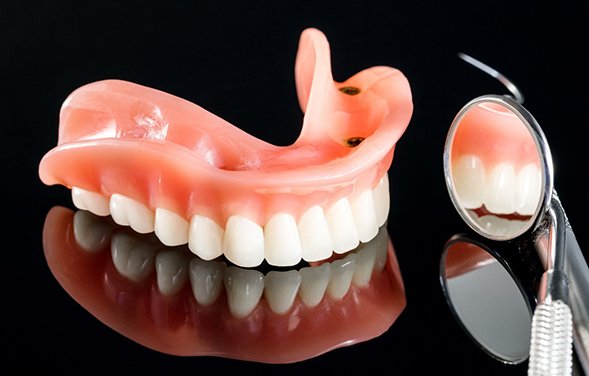
An entire row of missing teeth can be easily replaced with the help of 4-6 dental implant posts. Positioned within the jawbone, these prosthetics can deliver maximum support for the implant denture when it is put into place. Allowing for an improved bite force, you’ll be able to eat the foods you love without worrying about the embarrassment of having no teeth or possible slippage due to traditional dentures.
Learn More About All-on-4 Dental Implants Learn More About Implant Dentures
Understanding the Cost of Dental Implants

Dental implants are like the Rolls Royce of tooth replacement. They are on the higher end in terms of up-front cost, but you absolutely get what you pay for.
No two patients are alike, which is why we require an initial consultation for dental implants. This allows us to formulate a cost estimate based on the unique factors that make up your treatment plan. From here, we can discuss ways to make the financial aspect of your care feasible.
Until we can meet you in person, here’s what you should know about the cost of dental implants in general.
Preliminary Treatments & Dental Implant Surgery

Dental implants rely heavily on a strong, healthy jaw for support. For that reason, patients who suffer from oral health problems are likely to need preliminary treatments (like gum disease therapy or bone grafts) in order to prepare them for the implants. Obviously, these procedures add to the overall cost of treatment.
As for the surgery itself, that should be handled in-house by Dr. O’Brien himself. That means that we’ll be able to give you a precise estimate of what that surgery will cost before doing anything.
Pricing Out The Parts of Your Dental Implant

There are several factors that go into determining the overall cost of your dental implants. Besides the surgery itself, it’s also smart to consider:
- How many dental implants you’re going to need. A single dental implant will cost much less than an all-on-4 denture, for example.
- Which restoration you’re using. Crowns tend to be less expensive than bridges, which are in turn less expensive than dentures. Typically, the smaller the restoration, the more affordable it will be.
- The size of the dental implant, which depends on where it’s placed inside the jawbone.
- The manufacturer of the dental implant.
How Dental Implants Pay for Themselves

Again, it’s true that dental implants have the highest upfront cost of any tooth replacement option. However, it’s also true that dental implants consistently outlast those other tooth replacement options by a factor of two to one.
While you may have to spend more money in the short term, the fact that dental implants can easily last a lifetime. That saves you the cost of replacing them and affords you significant peace of mind that dentures and bridges can’t offer. Thinking about it that way, it’s not unreasonable to say that dental implants really do pay for themselves.
Does My Dental Insurance Cover Dental Implants?

Dental implants rely heavily on a strong, healthy jaw for support. For that reason, patients who suffer from oral health problems are likely to need preliminary treatments (like gum disease therapy or bone grafts) in order to prepare them for the implants. Obviously, these procedures add to the overall cost of treatment.
As for the surgery itself, that should be handled in-house by Dr. O’Brien himself. That means that we’ll be able to give you a precise estimate of what that surgery will cost before doing anything.
Making Dental Implants Affordable

Dental implants rely heavily on a strong, healthy jaw for support. For that reason, patients who suffer from oral health problems are likely to need preliminary treatments (like gum disease therapy or bone grafts) in order to prepare them for the implants. Obviously, these procedures add to the overall cost of treatment.
As for the surgery itself, that should be handled in-house by Dr. O’Brien himself. That means that we’ll be able to give you a precise estimate of what that surgery will cost before doing anything.
Dental Implant Technology

Dental techniques and technology become more advanced each year. Today, we use a wide range of techniques to make dental implant placement go as successfully and smoothly as possible. Read on to learn about some of the advanced pieces of technology that we use here at O'Brien Dental Wellness Center.
3D Cone Beam Imaging/3D CT Scanning

Dental X-rays are used to aid dental professionals to see the oral structures of the mouth that are hidden and difficult to see with the naked eye. This includes the roots of the teeth and jawbone. However, X-rays can’t detect everything, so we use a 3D cone beam scanner. This piece of technology shows us the important details that aren’t visible with a digital X-ray. This includes nerve pathways, blood vessels, and the thickness of the jawbone. With our 3D CT scanner, we can plan exactly where dental implants should be placed for the highest probability of success.
Guided Dental Implant Surgery

Using the CBCT scan of your mouth, we can create a 3D-printed surgical guide. This gives us a clear indication of where your dental implants should be placed. It also provides enhanced precision that makes your treatment more comfortable and reduces inflammation and bruising. Treatments performed with a surgical guide also tend to require smaller incisions, meaning an easier recovery time following your surgery.
Digital Impressions System

If you’ve gotten a dental crown or orthodontic treatment in the past, you probably remember the gooey putty that you had to bite down on to make your impressions. The good news is that this is a practice of the past. Today, we use digital impressions. They are easier to take and produce highly accurate and reliable images. This simplifies the process of providing patients with high-quality, perfectly fitting restorations.
Advanced Dental Implant Procedures
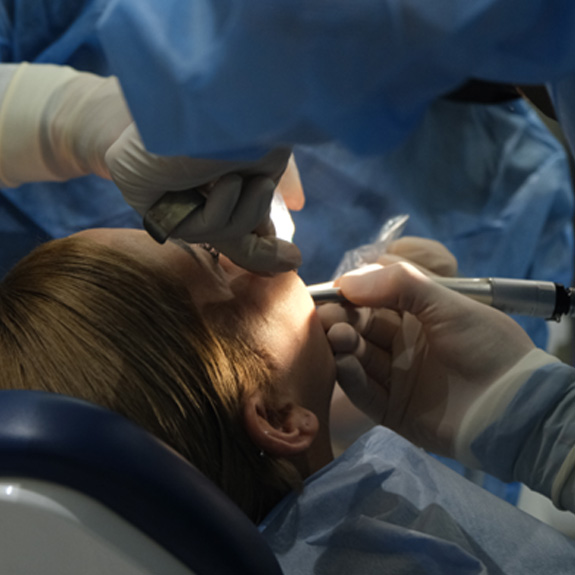
Not everyone is a good candidate for dental implants right away. Sometimes, preliminary procedures are necessary to prepare your mouth for the procedure. This is because dental implants heavily rely on a strong jawbone and healthy surrounding tissue. Here are some advanced procedures that are often used to prepare patients for their new smile.
Bone Grafting
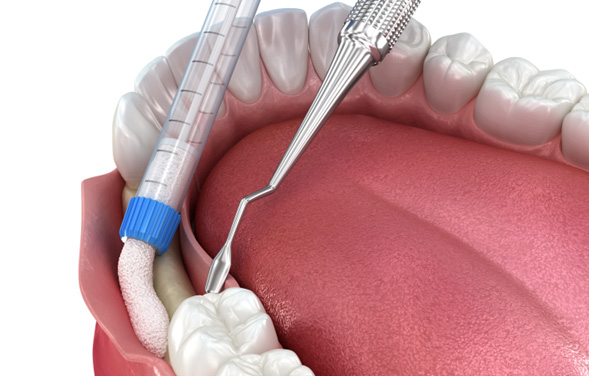
To have successful dental implants, sufficient jawbone density is crucial. This is why your dentist might recommend that you have bone grafting before you move forward with the dental implant placement procedure. This is more common for patients who have been missing teeth for a long period. Bone grafting works by transplanting bone minerals to the appropriate areas of your jawbone. This usually takes several months to heal, but it makes a huge difference in the longevity of your dental implants.
Sinus Lift
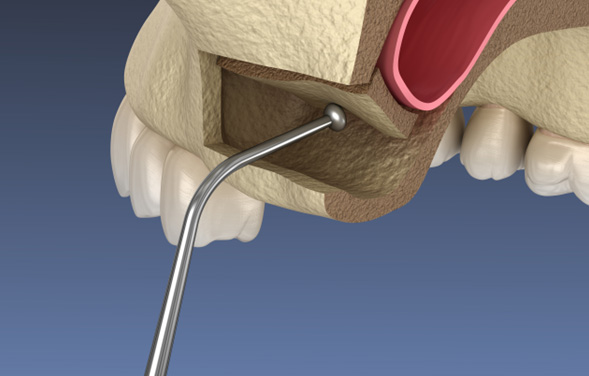
When dental implants are placed in the back of the mouth, it sometimes becomes necessary to also perform a sinus lift. This is because when you are missing teeth, it can create a significant gap. Without enough bone present to keep the implant in place, it could protrude into the sinus cavity and lead to complications. To keep this problem from occurring, the sinus can be vertically lifted, and grafting material can be placed around the implant. This helps to cut down on recovery time and increases the success rate.
PRP/PRF Treatment
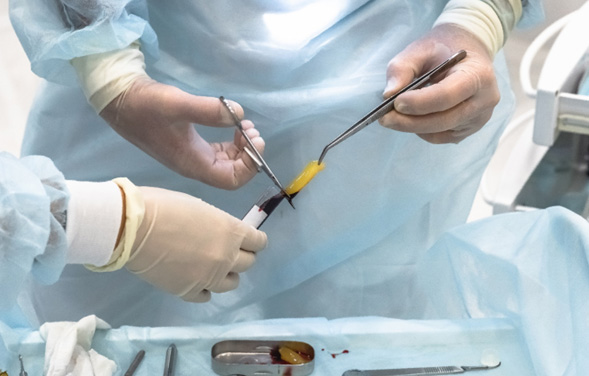
Proper healing is needed for successful replacement teeth. PRP/PRF treatment involves using your blood to speed up the healing process during recovery. The extraction of your blood will occur to encourage faster healing. Since your own blood is being used for this, there is a reduced risk of developing an infection.
Maintaining & Caring for Your Dental Implants

Ultimately, you can trust dental implants as tooth replacements. They may even keep your smile whole and healthy for a lifetime! Still, these prosthetics need maintenance to work well. Implants can easily fail from damage or infections otherwise. As such, you’ll want to follow good dental implant care habits in Tulsa. Luckily, we at the O’Brien Dental Wellness Center are here to share a few. Just keep reading to learn about them and ensure your implants last.
Make Oral Hygiene a Priority

True enough, implants can’t get cavities; their materials don’t erode like enamel can. Despite that fact, though, you simply must clean the prosthetics daily.
You see, implants depend on your adjacent teeth and gums. Said body parts keep your restorations stable and secure. When they degrade, your new teeth can become loose and eventually fail. (For example, gum disease often triggers gum recession – a condition known to loosen implants.)
Given these facts, you’ll want to stick to proper oral care. In particular, remember to brush twice daily, floss once daily, and rinse with mouthwash often.
Eat a Healthy Diet

Because implants restore bite force, they usually let you eat as you please. However, it’s still a good idea to follow a mouth-healthy diet.
Even after their fusion is over, implants are vulnerable to certain foods. Hard items – hard pretzels, nuts, etc. – can chip the prosthetics. At the same time, sticky and sugary stuff wedges between implants and decays nearby teeth. These traits mean sweet treats can trigger implant failure.
Meanwhile, foods with mouth-healthy nutrients help implants last. Those with calcium, phosphorus, and vitamin C can prevent gum disease and strengthen your jaw.
Break Bad Habits

While they look harmless, bad oral habits can make implants fail or break. That being the case, quit such practices before or soon after treatment.
For instance, just look at the act of smoking. Many tobacco products – especially cigarettes and cigars – slow recovery from implant surgery. They also tend to cause gum disease, which raises your odds of implant failure.
Another poor habit to stop is chewing hard objects. You can chip your teeth by biting on fingernails, ice, and other such things.
Protect Your Dental Implants

To be clear, implants are simply durable; they aren’t indestructible or immune to damage. Consequently, you should take suitable steps to keep them safe.
The best of these protective measures is to wear an oral appliance. By wearing a sports mouthguard, you’d keep your teeth safe from physical injuries. Meanwhile, a nightguard would prevent the wear and tear of bruxism during the night.
Schedule Regular Dental Checkups

No matter your level of care, you need help to maintain implants. There are issues you’ll inevitably miss if you work on your own. Therefore, remember to attend six-month dental checkups and cleanings. These visits with a dentist offer great protection.
If you weren’t aware, dental checkups prevent threats to your implants. Their core function is to treat oral health issues before they worsen. As a result, these trips to the dentist will nip potential implant problems in the bud.
Dental Implants Post-Op Instructions

Once you’ve undergone the implant placement surgery, you will typically need to expect a recovery period. By ensuring that you heal properly after your procedure, you can maximize the rate of treatment success. Our team will provide you with specific dental implant post-op instructions to help you maintain a healthy smile while allowing your new tooth root to heal. Here are some of the typical steps that you can expect to take.
What to Do Directly After Dental Implant Surgery

After finishing your dental implant surgery, you’ll have to protect the blood clot that is supposed to form around the surgical site. This means you’ll need to refrain from certain habits to prevent disturbing the area, such as spitting, smoking, touching it with your tongue or fingers, and drinking through a straw. Be sure to also get plenty of rest to optimize your healing period, and elevate your head while you sleep to avoid blood rushing to your head.
Common Side Effects When Recovering from Dental Implant Placement

Some of the most common side effects that patients encounter after dental implant surgery involve:
- Soreness: It’s normal to feel some slight discomfort following your procedure, which can typically be managed with pain relievers.
- Swelling: There may be some inflammation that occurs around the gums for the first 72 hours. Try using a cold compress to minimize swelling.
- Bleeding: Some mild bleeding can likely happen for a few days after your treatment. You can alleviate the situation with a clean gauze or washcloth and light pressure.
Your Diet After Dental Implant Surgery

Since you’ll need to rest frequently and avoid disturbing the surgical site, it’s best to stick to softer foods while you recover. These can include:
- Mashed potatoes
- Soup
- Pasta
- Yogurt
- Applesauce
- Scrambled eggs
- Pudding
Post-Op Health & Oral Hygiene

As long as you stay clear of the surgical site, you’ll be able to carefully brush your teeth the day after your placement surgery. The last thing you want to do is disturb the blood clot that needs to form around your dental implant. That’s why, when rinsing your mouth, use salt water and avoid spitting it out. If you use mouthwash, choose one that isn’t alcoholic, which can aggravate the tissue surrounding the implant.
What to Do After Your New Teeth Are Attached

After getting your new replacement crown, bridge, or denture, our team will double-check that your bite is correct and that you’re satisfied with your complete smile. It’s natural to feel some sensitivity in the area, but you can manage this with OTC pain medication. If you do notice any abnormalities after this appointment, such as inflammation or bleeding, notify us for help.
Dental Implant Failure & Salvage

While dental implants have an impressively high success rate of 95 percent after 10 years, there are a number of underlying factors that can play a role in implant failure in Tulsa. In cases where your dental implants aren’t functioning like they should be, they are causing you discomfort, or are loose, Dr. O’Brien can help salvage them.
Learn More About Dental Implant Failure & Salvage
Dental Implant FAQs
Am I Too Young to Get Dental Implants?
In most cases, dentists won’t provide dental implants to patients who are not at least 18 years old. Since the jawbone is still developing until then, embedding these posts into the bone tissue can disrupt the development, resulting in problems. For most people, the jawbone won’t be fully developed until young adulthood. Some patients’ jaws finish developing during their mid-20s. Our team will review your oral situation, assess your jawbone density, and determine if dental implants are a viable option for renewing your smile.
Does Getting Dental Implants Hurt?
Firstly, your jawbone doesn’t have many nerve endings present, so you’ll be less likely to experience much pain or discomfort. Of course, we’ll also numb your mouth with a local anesthetic to ensure that you’re pain-free and completely comfortable throughout your procedure. Though you won’t feel much during your appointment, it’s normal to feel some soreness for several days after getting your implants. You can easily manage this with over-the-counter and prescribed painkillers, as well as cold compresses to minimize discomfort and swelling. If your condition gets worse, notify us right away.
How Long Do Dental Implants Last?
Due to being biocompatible with the jawbone, dental implants can often last anywhere from several decades to a lifetime if you practice good oral hygiene every day. The lifespan of your restorations will also depend on several factors, such as your health and lifestyle choices. To make the most of your newly rebuilt teeth, make sure to brush, floss, and rinse with mouthwash daily to maintain healthy gums. Also, visit your dentist every six months and refrain from biting into anything, especially sticky or hard.
Can I Get Dental Implants If I’m Diabetic?
As long as you have your diabetes under control, you may be eligible for dental implants. If not, your condition can end up delaying your recovery process, which can result in difficulties with your post fusing properly with your jawbone. Once you have your situation in check, you should have the same chances of dental implant success as a nondiabetic patient! Make sure to speak with your endocrinologist or primary physician about addressing your blood sugar levels if you’re diabetic and interested in dental implants.
